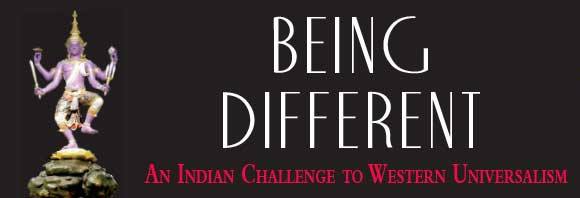Table of Contents
| Introduction | 1 | |
| #1: Embodied Knowing versus History-centrism | 5 | |
| #2: Integral Unity versus Synthetic Unity | 7 | |
| #3: Anxiety over Chaos versus Comfort with Complexity and Ambiguity | 8 | |
| #4: Cultural Digestion versus Sanskrit Non-translatables | 9 | |
| 1. | The Audacity of Difference | 11 |
| Piercing the Pretense of Pluralism | 15 | |
| Difference: Anxiety or Mutual Respect? | 25 | |
| Digestion and Assimilation | 36 | |
| False Resolutions of Difference Anxiety | 39 | |
| Purva Paksha: Reversing the Gaze | 48 | |
| 2. | Yoga: Freedom from History | 54 |
| Two Ways of Knowing the Divine | 55 | |
| Explaining Dharma to a Western Audience | 60 | |
| Itihasa Combines History, Myth and More | 63 | |
| How Embodied Knowing Works | 70 | |
| How History-centrism Works | 83 | |
| Authority in the Prophetic Traditions | 87 | |
| 3. | Integral Unity and Synthetic Unity | 101 |
| Integral Unity and Synthetic Unity Defined | 105 | |
| Comparison of Cosmologies | 111 | |
| Indra’s Net | 114 | |
| Time, Flux and Non-linear Causation | 119 | |
| Views and Relative Knowledge | 126 | |
| Freedom and Pluralism | 131 | |
| The Synthetic Unity of the West | 140 | |
| The Templeton Project to Re-invent the West | 141 | |
| The Birth of the West: Inherent Problems | 144 | |
| Incompatible: Christian Dogma and Greek Reason | 149 | |
| Five Synthetic Movements in the West | 154 | |
| 4. | Order and Chaos | 167 |
| Indian ‘Chaos’ and Western Anxiety | 170 | |
| Indian Comfort with Chaos | 178 | |
| Sacred Stories | 183 | |
| Contextual Ethics | 191 | |
| Aesthetics, Morality and Truth | 203 | |
| Dharmic Forest and Judeo-Christian Desert | 212 | |
| Western Joker and Indian Clown | 216 | |
| 5. | Non-translatable Sanskrit versus Digestion | 220 |
| Integral Unity as Vibration | 222 | |
| Discovery of Sanskrit | 228 | |
| Sanskriti, the Dharma Civilization | 239 | |
| Sanskriti and Pan-Asian Civilization | 244 | |
| Non-translatable Categories | 249 | |
| 6. | Contesting Western Universalism | 307 |
| Germany as a Case Study inn Western Digestion and Synthesis |
310 | |
| Common Responses to Western Universalism | 325 | |
| Conclusion: Purva Paksha and the Way Forward | 337 | |
| Purva Paksha and Sapeksa-Dharma | 338 | |
| Anticipated Western Responses | 342 | |
| Challenging the Leaders of Dharma | 345 | |
| Gandhi’s Sva-dharma and Purva Paksha | 347 | |
| Appendix A: The Integral Unity of Dharma | 354 | |
| Hinduism’s Integral Unity of God-Cosmos-Human | 355 | |
| Buddhism’s Approach to Integral Unity | 362 | |
| Notions of Self in Hinduism and Buddhism | 369 | |
| Jainism: Multiple Perspectives and Mutual Respect | 369 | |
| Appendix B: A Systems Model of Dharma and Abrahamic Traditions |
371 | |
| Notes | 375 | |
| Index | 441 | |
| Bibliography | 459 | |
| Acknowledgements | 473 |


